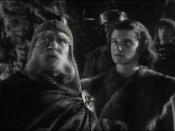Unquestioned Duty
Before contracts and signed agreements, the only thing there was, was a person's loyalty and trust. In Medieval times it was important for a man to understand his duty and relationship to God as well as to his earthly king. We are able to see such characterization of this bond with the title character in The Song of Roland and with Macduff in Shakespeare's Macbeth. Roland and Macduff both seem to be the essence of loyalty, even though this devotion leads them down two very different paths.
Also connected to this theme of loyalty, vassalage, and the will of God and man's place, is duty. It is for duty, not love of war that Roland fights to the death at Rencesvals. Duty causes Charlemagne, Roland's earthly king, to retaliate his death. In this poem, duty is often connected to love. The bonds between Charlemagne and Roland, and between Roland and his men, are exemplified by deep respect and affection.
Duty arises instinctively from this love, just as unquestioning duty follows naturally from the magnificent love of God.
Even the pagans in The Song of Roland can be considered heroic when they are evaluated in terms of loyalty and vassalage. The feudal system linked lords and vassals with a series of obligations and loyalties. A vassal gave his total loyalty in exchange for protection and vengeance should the vassal be killed in service of his lord. In this poem, vassalage is depicted as a parallel of Christianity. Roland's ultimate lord is God and it is in serving Charlemagne that Roland fulfills his duties as a Christian.
Our other loyal conqueror is Macduff. Macduff shows his loyalty to King Duncan, his earthly king, when he discovers the truth behind Duncan's murder. While Macduff was very loyalty to Macbeth, he...


